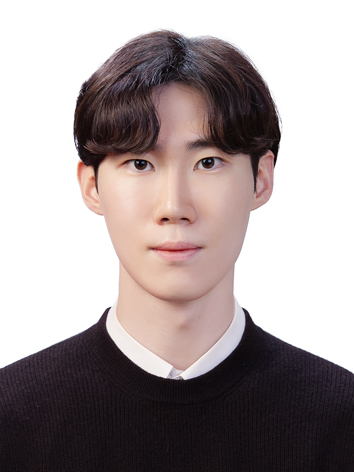[Herald Interview] For filmmaking duo, each serendipitous meeting sparks a story
By Moon Ki-hoonPublished : Dec. 18, 2024 - 16:07

In a dimly lit meeting room at the French Embassy in Seoul, filmmakers Cagla Zencirci and Guillaume Giovanetti recall a defining moment at Busan's UN Memorial Cemetery. There, they bumped into a Turkish woman examining tombstones for traces of her grandfather, a soldier who fought in the Korean War. The chance meeting in 2018 would grow into "Ghost and Found," their latest multimedia project, which came out of the 2 1/2-month Villa Busan residency that ended just last week.
The initiative, established in October, involves a unique cultural venture: Villa Busan, set up by the French Embassy in Korea and the French city of Cannes at Busan's Hongti Art Center in cooperation with the city of Busan, is Korea's only foreign government-backed artist residency. Tucked away on a seaside cape in the southern port city's industrial Saha-gu, Hongti Art Center has drawn a steady stream of international artists since opening in 2013.
"Those coincidences bring on very spiritual things," says Zencirci. Her voice, though barely above a whisper, carries an unmistakable intensity. The duo's creative journey kicked off with just such a coincidence – Zencirci was an economist and Giovanetti an engineer, both working at the French Embassy in Turkey 20 years ago. Neither had formal training in filmmaking.
"I couldn't imagine a lifetime of being unhappy," Zencirci quips. "We gave ourselves three years to try -- we could always go back to being unhappy in offices."
Today, Zencirci and Giovanetti are established figures in the international circuit. Their works have turned up at major film festivals, drawing praise for weaving folklore with contemporary questions.
The duo's 2018 feature film "Sibel," which follows a mute woman who whistles to communicate in a secluded mountain community along Turkey's Black Sea coast, put them firmly on the map of global arthouse cinema. The film also marked the duo's official debut with Korean audiences, making its way to the 2018 Busan International Film Festival.
"We always seek out fables in our work," Giovanetti says, his reserved demeanor hinting at a certain thoughtfulness. "When we spend time in local communities, we ask for their myths and legends. They become parallel narratives to our contemporary lives."
Running through their filmography is a clear thread: how real-life communities hold onto their spiritual heritage as they grapple with change, the staying power of folklore in modern life, and how unspoken bonds win out over linguistic barriers. In Turkey, where "Sibel" is set, the filmmakers cast the act of whistling in a dual light: an ancient tradition and a woman's defiant voice against silence.
In Pakistan, home to their 2012 feature film "Noor," they recruited actors right off the streets -- many illiterate or sharing no common language with the filmmakers – and built scripts around their stories, showing again how real connection cuts through language barriers.
This focus on the spiritual and the transcendent would play out differently in Korea, where they branched out into their first multimedia installation.

In its Nov. 6-20 run at Busan's Hong-ti Art Center, "Ghost and Found" brought together historical artifacts, oral histories and intimate video portraits to tell the story of a Turkish woman convinced her grandfather never died in the Korean War — a conviction sparked by a pair of boots sent back after his reported death that were not his size.
The exhibition offered a constellation of diverse narratives and media forms: vintage propaganda posters and military uniforms set up the historical backdrop, while recorded testimonies from locals added intimate perspectives. Video sequences, shot in today's Busan, pick up on wartime memories that still echo through present-day life.

Though multimedia work was new territory for the pair, they fell back on familiar creative ground. "In cinema, we take at least four years," Zencirci points out. "Here, in 2 1/2 months, we pulled together something concrete. But the process stays the same — you come up with an idea, flesh it out, then put it across to others."
True to their knack for chance discoveries, many stories popped up from everyday moments in local life. They teamed up with local crew and producers, picking up stories from conversations in Busan's streets and cafes. One day at the "40 Steps" – a historic site where during the 1950-53 Korean War many families promised they would meet should they become separated – an aged woman stepped up out of nowhere to share her story of arriving there as a 7-year-old refugee.
"We're interested in what the dead make the living do," Zencirci says. "How their stories shape our present choices." Giovanetti chimes in: "But it's not just about the past. We want to touch on today's Korea, what's really going on here and now, both socially and politically."
For all their embrace of chance meetings, the duo maps out their cross-cultural storytelling with care and nuance. "We only take on countries whose languages speak to us," says Zencirci, thinking back to their fascination with Korean cinema's "golden era" of the 1990s and early 2000s. "We always screen our finished work to the locals first. Their approval matters more than any critic’s," Giovanetti adds.
Looking ahead, Zencirci and Giovanetti are set to turn "Ghost and Found" into a full feature-length film, though they are in no rush. "Cinema comes down to timing," Giovanetti says. "Like good stories, films come together when they're ready."
With quiet conviction, Zencirci adds, "When we wake up in the morning, we know exactly what we want to do."



















![[Today’s K-pop] BTS’ Jimin logs 1.2b streams on Spotify in record time](http://res.heraldm.com/phpwas/restmb_idxmake.php?idx=642&simg=/content/image/2024/12/18/20241218050071_0.jpg&u=)